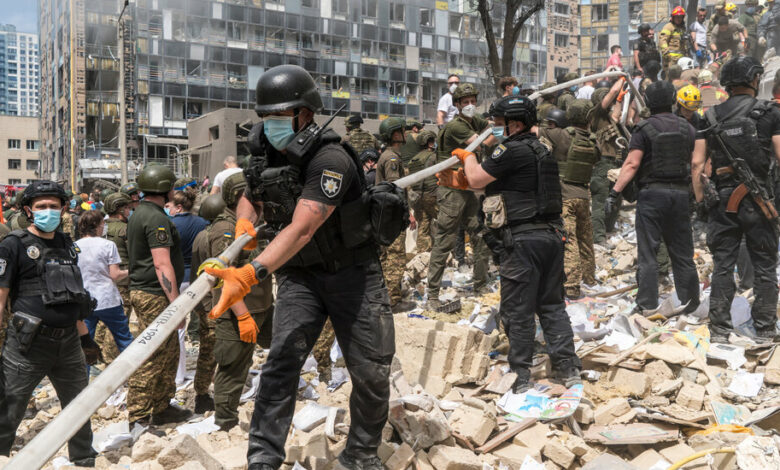A horrific scene of destruction is seen at Ukraine’s largest children’s hospital

Daryna Vertetska was sitting with her 8-year-old daughter in Ukraine’s largest children’s hospital on Monday morning when Russian missiles rang out in the sky.
Her daughter Kira was being treated for cancer as explosions rang out in the capital Kiev.
“We decided not to interrupt it,” Ms Vertetska said of the treatment.
As Kira continued her treatment, a rocket struck the Okhmatdyt Children’s Hospital directly, causing an explosion so loud it defied description, she said. Flying shards of glass cut into the child’s skin.
“She was very scared,” said Ms Vertetska, 33. Bleeding but alive, the couple clambered through the smoke and dust to safety.
The hospital where Kira spent five months to save her life is gone, another medical facility destroyed by Russia during its years-long invasion of Ukraine.
As exhausted rescuers sifted through the rubble of the hospital on Tuesday, doctors and nurses rushed to help dozens of seriously ill children who must now seek care elsewhere. Many of them, like Kira, are undergoing intensive cancer treatments.
No children were killed in the hospital on Monday, but the destruction marked one of the worst days of violence against Ukrainian civilians in months, with more than 30 dead in Kiev alone. The Russian attack on Monday targeted the capital and cities across the country.
“I don’t want to, but I think I’m losing hope,” said Ms. Vertetska.
The attack on the hospital left young patients sitting in the street with IVs attached to their arms. The bombing also damaged Ukraine’s most advanced laboratory for testing and confirming certain types of cancer, Ukraine’s Health Ministry said, adding that it was assessing the condition of the equipment to see what could be repaired.
“It’s scary because this is the only reference laboratory in Ukraine that confirms all oncohematological diseases,” said Dr. Natalia Molodets, head of the pediatric hematology department of the Odessa Regional Children’s Hospital, referring to blood cancers.
Even in the first weeks of the war, when Russian troops tried to take Kiev, the laboratory remained operational, Dr. Molodets said.
“It is vital for our children,” she said.
Russia has targeted Ukrainian medical facilities since the early days of the war, a pattern outlined by a number of international human rights organizations. The bombing of a maternity hospital in Mariupol in the weeks after Russia launched its full-scale invasion of Ukraine was an early indication of Moscow’s brutal tactics.
The World Health Organization said in April this year that they… verified approximately 1,682 direct attacks in medical facilities using heavy weapons, resulting in 128 deaths and 288 injuries among staff and patients.
Around the same time the children’s hospital was hit on Monday, debris from another Russian missile crashed into the Isida maternity hospital and an adjacent private clinic elsewhere in Kiev. Nine people were killed in that attack, including two children.
Two other children – Maksym Symaniuk, 10, and his 9-year-old sister Nastia – were also killed by falling rocket debris near their home on Monday, officials said. the Ukrainian Karate Federation.
On Tuesday, Volodymyr Zhovnir, director of the children’s hospital in Okhmatdyt, testified about the strike at an emergency meeting of the United Nations Security Council.
“Both children and adults were screaming and crying in fear, and the wounded in pain,” he said. “It was a real hell.” More than 300 people were injured, including eight children, Mr Zhovnir said. Two adults were also killed, including a doctor.
At the Security Council meeting, Moscow denied targeting the facility, despite analysis of video footage and missile fragments collected by Ukrainian security services showing the hospital was hit by a Russian Kh-101 cruise missile.
International organizations including UNICEF and Ukraine’s Victor Pinchuk Foundation have pledged to help rebuild the hospital. But with some 7,000 complex surgeries performed in Okhmatdyt each year, doctors say it won’t be easy to replace.
President Biden, who welcomes Western leaders to Washington on Tuesday for NATO’s 75th anniversary, a statement issued He said Monday’s attack was a “horrific reminder of Russia’s brutality.”
Secretary of State Antony J. Blinken on Tuesday called the attack on the children’s hospital “particularly despicable” and added that it would only double Western military support to Ukraine.
Speaking to reporters in Washington alongside Ukrainian Foreign Minister Dmytro Kuleba, Mr Blinken said he had personally visited the hospital and met sick and injured children there during one of his several trips to Ukraine.
Children treated in Okhmatdyt often cannot be evacuated to the hospital’s bomb shelter during regular air raids because moving the patients would interrupt their care. Many of the patients are now being transferred to other hospitals in Ukraine, including in Odessa and Lviv.
As the country’s top children’s hospital, Okhmatdyt was also where children who had experienced intense physical and emotional trauma were sent for treatment. Staff are trained to handle some of the most difficult medical situations. But many said nothing could have prepared them for the horrors of Monday’s attack.
According to Nazar Borozniuk, a physiotherapist at the hospital, it was pure luck that no children died.
A video clip he filmed from the hospital after the attack showed ceiling panels and broken glass on the floor. “This is what everything looks like now,” he says in the video. “I hope nothing falls on our heads.”
In a telephone conversation on Monday evening, Mr. Borozniuk described the terrifying scenes that unfolded before the eyes of patients and staff at the hospital. “We started evacuating children, parents and families,” he said.
Hospital staff, along with emergency medical workers and volunteers, tended to the wounded on Monday. Other parts of the hospital, such as the emergency room, continued to function even as firefighters rained water over the ruins to prevent the fire from spreading.
“I couldn’t even answer the phone because my hands were covered in blood from helping,” Mr. Borozniuk said. “I just knew what to do with the children: give first aid, help the wounded and evacuate those who needed it,” he added.
The scene was so chaotic that Mr. Borozniuk said his feelings “just disappeared.” But as he drove home Monday night, hours after the hospital was hit, he finally began to process what had happened. “There’s definitely going to be psychological ramifications for everyone,” he said.
“We are all human.”
Oleksandra Mykolyshyn contributed to the reporting from Kiev, Dzvinka Pinchuk from Odessa, Eva Sampson from New York and Michael Crowley from Washington.




